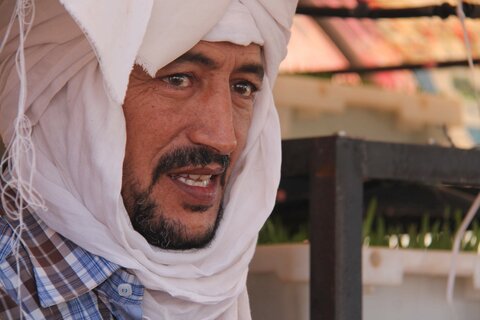Growing Food in the Algerian Desert
As the Global Festival of Ideas for Sustainable Development takes place in Bonn, Germany, this week (1-3 March), read about one of the innovative projects the World Food Programme (WFP) is showcasing there, allowing farmers to grow crops using up to 90% less water than traditional agriculture.

Amidst the sand dunes of the Algerian desert, the green of barley — or any other crop — seems an unlikely sight. Yet, in five camps hosting Sahrawi refugees near Tindouf, in the South West of the country, barley fodder is sprouting in miniature fields.

The secret behind these tray-sized oases is hydroponics, a technique that allows farmers to grow crops using up to 90% less water than traditional agriculture. With this method, plants do not need soil. They get the nutrients they need from special solutions, and develop up to twice as fast as in traditional farming. In hydroponic units — which can be fuelled by solar energy — light, temperature and water supply can be more precisely controlled and monitored than when plants are grown in soil. Crops are also pesticide-free.
"The lack of green fodder in the diets of our animals is a problem for us," explains Sahrawi refugee Maryam Abdelkader.
As the arid desert environment doesn't allow for agricultural opportunities, livestock is the main source of livelihood for up to 90,000 vulnerable Sahrawi, and therefore it is also their most prized possession.
Buying dry fodder on the market is expensive, so many refugees are forced to feed their herds leftovers and rubbish, including plastic. This affects milk production as well as the quantity and quality of the meat, which is reportedly making those who eat it sick. In addition, half of the lambs and baby goats die soon after birth due to the lack of sufficient, nutritious food.

"Now we have fodder in the camps and we still can't believe it," says Maryam. "We have noticed a considerable change in the meat and milk production of our animals. Thanks to this improvement, our food will be better."
Maryam and her sister Fatma are among the Sahrawi refugees who, with support from WFP, have enthusiastically embraced hydroponics over the past three months.

Innovative technologies such as hydroponics offer hope to the Sahrawi refugee community, which is grappling with the dual challenge of climate conditions and food security.
In Algeria, hydroponics is initially focusing on locally available barley seeds. With the help of WFP's Innovation Accelerator, WFP staff in Algeria are supporting the Sahrawi refugees to develop an adapted hydroponic greenhouse using locally available materials, and testing the best hydroponics methods at the local agriculture experimental centre. This is the first time hydroponics has been used by humanitarian organizations in the Middle East and North Africa countries where WFP works.

The fodder grows in seven-day cycles in a semi-controlled environment, in solar-powered container units. In the camps, refugee families or young entrepreneurial cooperative groups own a production unit and are responsible for running it. Each participating family receives training on the technical aspects of hydroponics and how to sell any harvests.
The plan is to explore how to grow other crops in the future, including alfalfa, vegetables or the moringa, enabling the Sahrawi to build sustainable livelihoods.
WFP is currently running hydroponics projects in Algeria, Peru and Jordan. At the Bonn festival, WFP aims to engage with participants and other UN agencies, NGOs, think tanks, ministries and the private sector on how to efficiently use available resources to feed people through sustainable agricultural practices like hydroponics. See here for more information.

